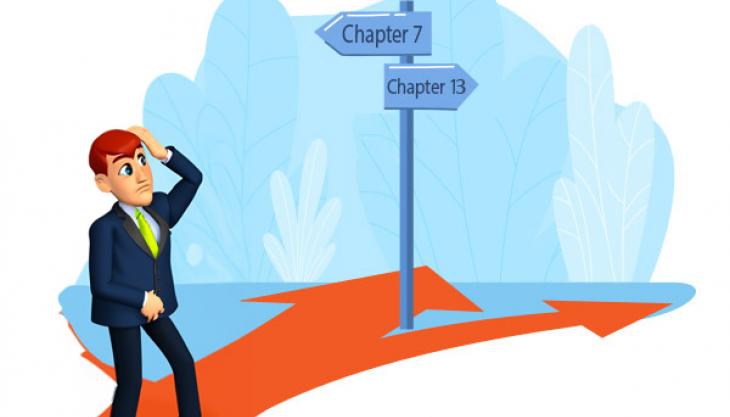Chapter 7 v. Chapter 13 / Comparison and costs to file bankruptcy
Submitted by Lawfirm Blogger on Wed, 08/09/2023 - 10:36am

Comparison:
The two most common types of bankruptcy for regular Americans are Chapter 7 and Chapter 13. Chapter 7 and Chapter 13 are the names of the sections of federal law that provide bankruptcy relief. Both Chapter 13 and Chapter 7 bankruptcies comes with their own costs and considerations.
A Chapter 7 is a type of bankruptcy mostly used by individuals: (1) who do not have assets that exceed available exemptions and (2) who can afford to pay their entire attorney fees and court costs up-front, before filing and (3) who are not behind in their payments on cars, trucks and home loans.
Exemptions are lists of the types and value of assets you get to keep, and don't lose, if you file bankruptcy. The amount and types of exemptions vary from state to state. "Applying North Carolina exemptions, most, if not all, of our clients, don't lose anything in Chapter 7 or Chapter 13" says John Orcutt, founder of the Law Offices of John T. Orcutt.
For those of you who simply can't afford to pay your entire attorney fee and court costs up-front OR who have value in assets that exceed available exemptions OR who are behind on payments on important assets, like cars, trucks, or homes, there is Chapter 13. In Chapter 13, you don't have to pay the entire attorney fee up-front. Most or all of your attorney fee can be added into your bankruptcy case for payment over time. "With us, if you qualify, and many people do, you can even get filed for $0 Money Down" says John Orcutt. Also, if you have value in assets that exceed available exemptions, Chapter 13 allows you to keep those assets as long as you pay in, over time, that excess value. If you are behind on important assets like your car, truck or home loans, Chapter 13 allows you to catch up your loans in easy payments over time.
And, that's just 3 reasons to file Chapter 13, as opposed to Chapter 7. There are at least 18 other reasons you would want to file Chapter 13, as opposed to Chapter 7" says Orcutt. Understand these reasons and you will have a better understanding of which chapter works best for you. Click here: 21 Reasons Why Chapter 13 and not Chapter 7.
Cost:
Looking only at cost, Chapter 7 costs less than Chapter 13. That's because, with Chapter 7 bankruptcy, most of the work is done up front and the entire case is wrapped up pretty quickly. So it’s a lot less total work on the attorney’s part, But, that fact alone does not mean the you should always file Chapter 7. "In our experience, most of the time, Chapter 13 is the better choice" says Orcutt. "It just depends on your particular facts and circumstances. There are many things possible using Chapter 13 that are just not available in Chapter 7.
Want to know what the Law Offices of John T. Orcutt charge, what all is involved, and what you get in return? For a full and transparent presentation (unlike any other). Click here: What Does It Cost To File Bankruptcy?.
Overall Benefit:
"Since the whole idea is to get you out of debt so you can get your life back" says Orcutt, "it is important for people to know that in most cases, both Chapter 7 and Chapter 13 allow you to keep the things you have while, at the same time, getting rid of massive amounts of debt. That's huge because less debt means a better life.." "Super important to know," says Orcutt, "whether its Chapter 7 and Chapter 13, we are able to 'turn lives around' for the vast majority of the people who come us for help" .